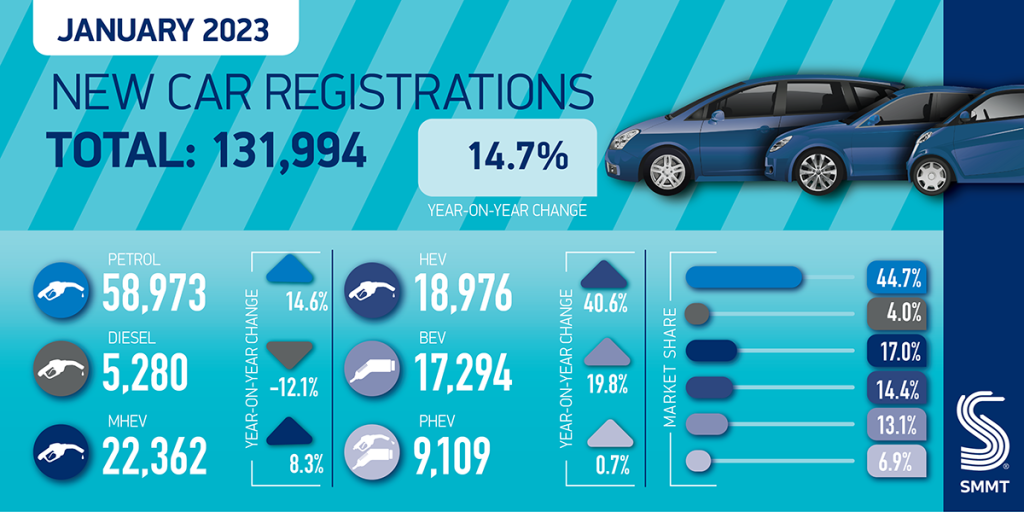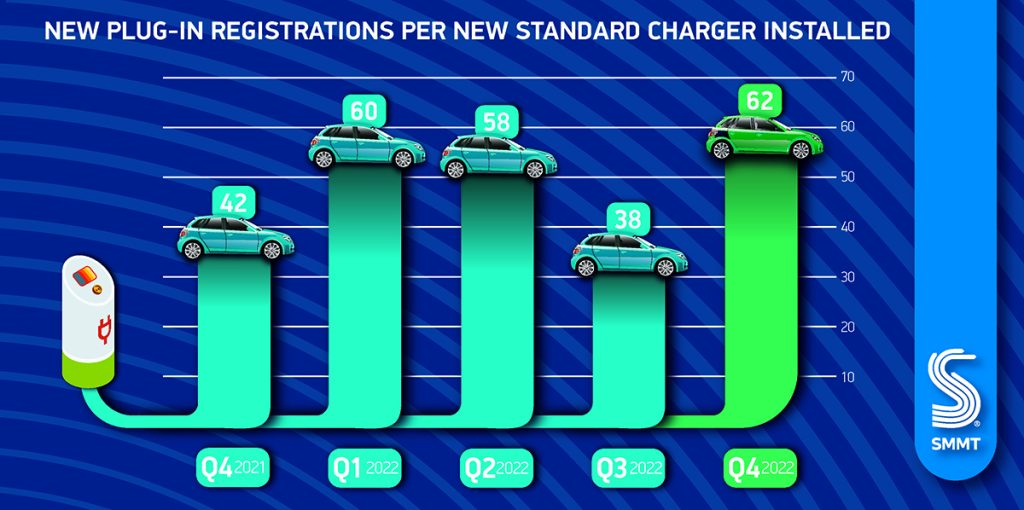The UK’s new car market grew in the first month of 2023, according to the January registration figures released by the Society of Motor Manufacturers and Traders (SMMT).
A total of 131,994 units left dealerships, setting the tone for what the SMMT is calling an ‘anticipated countercyclical year of growth’. This marks a year-on-year growth of 14.7%.
This was the best start to the year since January 2020’s pre-COVID 149,279 units and marks the sixth successive month of expansion. The January registration figures show that the market is continuing to recover following COVID and supply problems.
January registration figures show EV growth
Electrified vehicles notably drove the increase, as manufacturers continue to bring ever more choice to the market despite ongoing strains on the supply chains.
Hybrid electric vehicles (HEVs) comprised 14.4% of new car registrations, increasing volumes by 40.6%. Meanwhile, battery electric vehicle (BEV) registrations rose 19.8% to reach 17,294 units, or 13.1% of new registrations, slightly below the average recorded for 2022.

Plug-in hybrid vehicles (PHEVs) recorded a 0.7% rise in the January registration figures, although their share fell to 6.9% of new cars reaching the road. As a result, one in five new cars registered in the month came with a plug.
Plug-ins are anticipated to comprise of more than one in four new registrations this year, representing growth of 32.1% or approximately 487,140 units, and almost a third (31%) of the market in 2024 at 607,150 units.
Petrol vehicles led the way again in the January registration figures, with 76,216 units, including mild-hybrid models, representing growth of 14.8%. Diesel continued its decline, with a total of 10,399 vehicles registered. This 11.4% drop places the fuel type perilously close to being overtaken by PHEVs, which would drop it into last place in terms of counted fuel types.
It was also a strong month for large fleet registrations, which increased by 36.8% to 69,540 units, while registrations by private buyers fell by -4.3% to 59,639 units – reflecting some easing of supply and evidence of how shortages last year distorted market performance. Registrations by businesses, the smallest segment at 2,815 units, rose by 45.6%.
“The automotive industry is already delivering growth that bucks the national trend and is poised, with the right framework, to accelerate the decarbonisation of the UK economy,” commented SMMT Chief Executive Mike Hawes. “The industry and market are in transition, but fragile due to a challenging economic outlook, rising living costs and consumer anxiety over new technology. We look to a Budget that will reaffirm the commitment to net-zero and provide measures that drive green growth for the sector and the nation.”
The strong start to the year is mirrored in the latest market outlook, which anticipates 1.79 million new car registrations in 2023, an 11.1% increase on the past year but still well below 2019 levels. This also represents a 0.8% reduction on October’s outlook, against a weak economic backdrop. However, a further 9.3% increase is expected next year, with 1.96 million new cars expected to join the road in 2024.
Charging infrastructure at critical point
Those following automotive news over the festive period may have seen stories of Tesla drivers queuing at service stations for up to three hours to charge their vehicle. Recently, social media has been awash with similar tales, with queues at motorway services across the UK. Other media outlets have reported on drivers trading in their BEVs for petrol or diesel vehicles due to the lack of charging infrastructure – although as registration figures count from the point of which the vehicle takes to the road, these will not be counted for some time yet.

The SMMT is using the January registration figures to again call out the problems with chargepoint rollout. During Q4 2022, the ratio of new chargepoint installations to new plug-in car registrations dropped to one for every 62 – a significant fall compared with the same quarter last year, when the ratio was 1:42.
As a result, in 2022, one standard public charger was installed for every 53 new plug-in cars registered, the weakest ratio since 2020. The SMMT believes that mandating rollout targets for infrastructure and regulating service standards would give drivers certainty they can always find a working, available charger. Infrastructure must be built ahead of demand else poor provision risks delaying the electric transition. The January registration figures show the increase in demand is not slowing as yet.
More immediately, The SMMT believes that the upcoming Budget is an opportunity to implement measures that support the transition. Reducing VAT on public chargepoint use from 20% to 5% in line with home charging would ensure more affordable access for all and underpin a fair net zero transition.
It also believes the government should also review proposals to graft a Vehicle Excise Duty regime designed for fossil fuel cars onto zero-emission vehicles (ZEVs). The higher production costs associated with electric vehicles means that currently more than half of all available BEVs would be subject to the expensive car supplement due to apply to ZEVs from 2025.
“While it is right that all drivers pay their fair share, existing plans would unfairly penalise those making the switch, and risk disincentivising the market at the time when EV uptake should be encouraged” the organisation states.




You must be logged in to post a comment.